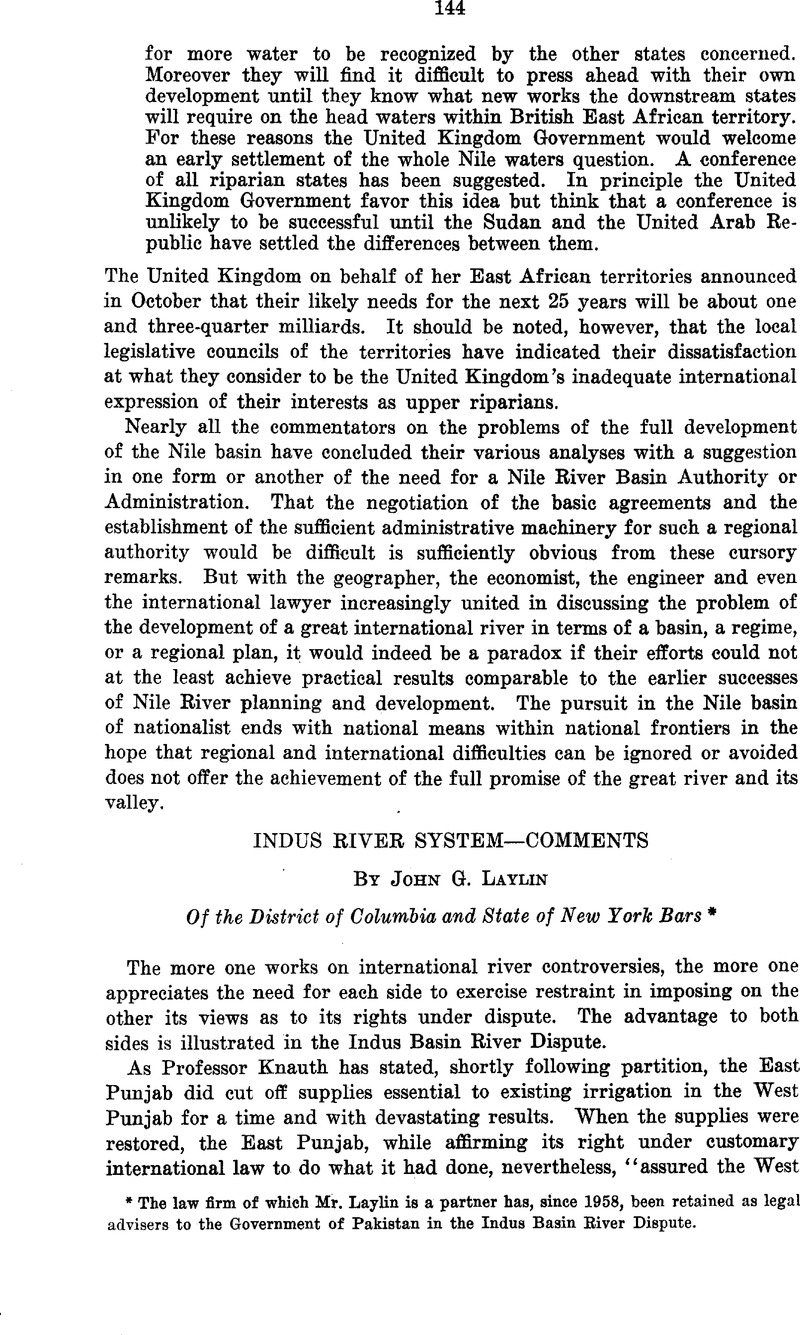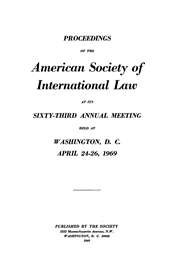Article contents
Indus River System—Comments
Published online by Cambridge University Press: 27 February 2017
Abstract

- Type
- Fourth Session
- Information
- Proceedings of the American Society of International Law at its annual meeting (1921-1969) , Volume 54 , 1960 , pp. 144 - 150
- Copyright
- Copyright © American Society of International Law 1960
References
1 Joint Statement of May 4, 1948, Canal Waters Dispute, p. 105 (published by the Government of Pakistan, May, 1958).
2 Ibid.
3 Telegram from Jawaharal Nehru to Zafrullah Khan, June 5, 1948, Canal Waters Dispute, p. 118.
4 Ibid.
5 Ibid., at p. 119. Compare the remarks of the delegate of Lebanon, General Assembly, 6th Sess., 6th Committee, p. 202 (1952), criticizing a proposed definition of aggression on the ground that it would not cover diversion of an international stream “so that the neighboring country suffered hunger and thirst. ” See also U.N. Doc. A/2211, Eeport of the Secretary-General: Question of the Definition of Aggression, pars. 328–329.
Cf. Professor Juraj Andrassy's statement (Institut de Droit International, Ninth Commission, Utilization of Non-Maritime Waters (Apart from Navigation), Preliminary Eeport, 1959, p. 70) that recent history offers abundant proof that controversies over international waters can be disputes “ the continuance of which is likely to endanger the maintenance of international peace and security.”
6 Telegram from Zafrullah Khan to Jawaharlal Nehru, July 6, 1948, Canal Waters Dispute, p. 127.
7 Telegram from Zafrullah Khan to Jawaharlal Nehru, May 22, 1948, ibid., p. 109.
8 Ibid.
9 Telegram from Jawaharlal Nehru to Zafrullah Khan, May 23, 1948, ibid., p. 110.
10 Pakistan note of Aug. 23, 1950, ibid., pp. 247, 248.
11 India made a counter-proposal that the issues be put before a four-judge court consisting of “two judges from each country.” (Indian note of Sept. 15, 1950, Canal Waters Dispute, pp. 257, 258.) Suggestions by Pakistan that a court to be effective needed an odd number of disinterested judges were met with an Indian suggestion that resort to third-party arbitration might later be agreed upon if a deadlock occurred. (Note of Prime Minister Jawaharlal Nehru to Prime Minister Liaquat Ali Khan, Nov. 24, 1950, ibid., pp. 284, 287.)
12 Indian note of Sept. 18, 1951, ibid., pp. 323, 326.
13 Letter of President Black of Sept. 6, 1951, Canal Waters Dispute, Documents Relating to Negotiations Under the Good Offices of the International Bank for Reconstruction and Development 11 (published by the Government of Pakistan, June, 1958. This publication will be referred to as “Canal Waters Dispute II. ”) The Lilienthal proposal was made in an article in Collier's, Aug. 4, 1951.
14 Identical letters from President Black to the Prime Ministers of India and Pakistan, March 13, 1952, Canal Waters Dispute II, p. 17.
15 Note from Prime Minister Nehru to President Black, June 21, 1954, ibid., pp. 81, 82.
16 48 A.J.I.L. 287 (1954).
17 Rep., 46th Conf., International Law Association vii (1954).
18 Resolution adopted unanimously, Aug. 31, 1956, Art. VI, p. 2, Principles of Law Governing the Uses of International Bivers, Eesolution Adopted by the International Law Association at its Conference held in August, 1956, at Dubrovnik, Yugoslavia, together with Eeports and Commentaries Submitted to the Association (Lib. Cong. Cat. Card No. 57–10830). Art. VI reads as follows:
“A state which proposes new works (construction, diversion etc.) or change of previously existing use of water which might affect utilization of the water by another state must first consult with the other state. In case agreement is not reached through such consultation, the states concerned should seek the advice of a technical commission; and if this does not lead to agreement, resort should be had to arbitration.”
More than sixty states which are riparian to international rivers have made arbitral commitments with one or more of their neighbors. The commitment may be in the form of arbitration provisions in a waters treaty, general arbitration treaties which would cover some or all waters disputes, or reciprocal acceptances of the compulsory jurisdiction of the International Court of Justice. Only about fifteen instances have been found where riparian states have made no such commitments.
19 The State Deparement 's conclusions were stated in a memorandum which was presented to the Senate Committee on Interior and Insular Affairs: Legal Aspects of the Use of Systems of International Waters with Reference to the Columbia-Kootenay Eiver System under Customary International Law and the Treaty of 1909, Memorandum of the State Department, S. Doc. No. 118, 85th Cong., 2d Sess., April 21, 1958.
In February, 1959, the Council of the Section of International and Comparative Law of the American Bar Association adopted a resolution that the United States “should not divert any boundary inland waters or international rivers without consulting with and obtaining the agreement of any interested foreign state or seeking a solution in accordance with the principles and procedures set out in the Charter of the United Nations and the procedures envisaged in article 33 thereof, or other treaty provisions.” ABA, Section of International and Comparative Law, 1959 Proceedings, p. 128. The resolution was adopted by the entire Section on May 19, 1959.
The Inter-American Bar Association, at its Tenth (Buenos Aires) Conference in November, 1957, adopted a resolution containing the following Article I (3):
“States having under their jurisdiction part of a system of international waters are under a duty to refrain from making changes in the existing regime that might affect adversely the advantageous use by one or more other states having a part of the system under their jurisdiction except in accordance with: (i) an agreement with the state or states affected or (ii) a decision of an international court or arbitral commission.”
20 See Pakistan note No. I(I)-4/5/58, of Aug. 29/30, 1958. India replied (Note No. F.7(2)/58-Genl(P), Oct. 7 1958) that the Minister's speech “was in no sense a threat or an ultimatum.”
21 New York Agreed Recommendation No. 1 reads as follows:
“Co-riparian States should refrain from unilateral acts or omissions that affect adversely the legal rights of a co-riparian State in the drainage basin so long as such co-riparian State is willing to resolve differences as to their legal rights within a reasonable time by consultation. In the eventuality of a failure of these consultations to produce agreement within a reasonable time, the parties should seek a solution in accordance with the principles and procedures (other than consultation) set out in the Charter of the United Nations and the procedures envisaged in Article 33 thereof.”
This principle has recently received yet another endorsement from a most authoritative source: Professor Juraj Andrassy, rapporteur of the Ninth Commission of the Institut de Droit International. In the Commission's preliminary report (see note 5 above) ‘Professor Andrassy recognized that the duty to refrain from action follows from Art. 33 of the U.N. Charter in waters disputes covered by that article. But he argues further that the principle applies to any waters dispute because of the provision of Article 2 (4) of the Charter that Members “shall refrain in their international relations from the threat or use of force against the territorial integrity or political independence of any state.”
22 Pakistan note No. I(I)-4/5/58, of Aug. 29/30, 1958.
23 U.N. Press Eelease, May 19, 1959.
24 International Bank for Reconstruction and Development, Press Release, March 1, 1960. The treaty was signed at Karachi on Sept. 19, 1960.
- 1
- Cited by




